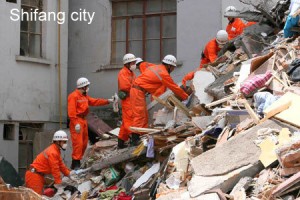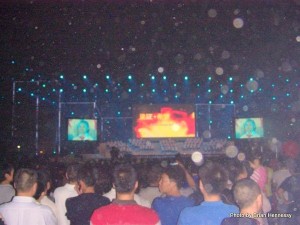Sichuan earthquake. Shifang. Remembering.
Brian Hennessy. China Australia Consult. 5:12 (2009).
On the eve of 5:12, the anniversary of the Sichuan earthquake, I was in the provincial town of Shifang, very close to the epicenter at Beichuan. 6000 residents perished here. China Central Television (CCTV), a nationwide government-controlled service, was due to televise a special live program in memory of the earthquake, the victims, and the survivors and their rescuers later in the evening. This is why we were here.
Earthquake. Shifang. Remembering.
______________________________________________________________
A huge temporary stage with banks of lighting had been erected, and a special area provided for honoured guests such as medical personnel, military rescuers, and assorted government workers. All seated in orderly rows. Doctors here, nurses there, and party members up the front.
A large metal fence surrounded this controlled environment, separating it from the masses clamouring to get in and participate in the spectacle. One small gate allowed the proletariate to enter. A crush of bodies trying to squeeze through a narrow opening in the fence policed by security guards.
I entered the crush, and was dragged by friends through the scrum surrounding the entrance and into the standing-room only area way up the back. This is where the ordinary folk were congregated, in good-humoured clusters of family groups, volunteer rescuers, and so on. Not much room to move, but at least we were on the right side of the barrier fence.
Like everybody else, we waited in anticipation for the expected tribute to the dead, and the ordinary soldiers, rescuers, and volunteers who did such a magnificent job during those grim post-earthquake days of sadness and suffering.
The show began with some pre-programmed, canned, self-congratulatory patriotism. Fair enough. This was followed by a choir of sweet-singing young ladies – teenagers – representing hope for the future. Lovely, but predictable. Then an actor in a Beijing studio (pre-recorded) read some famous lines (A stirring poem? Some nationalistic verse written especially for this occasion?). Boring.
By this time, the crowd was getting restless. People chatting away to each other and shuffling their feet. Turning around to see who else they knew in the crowd. Looking for friends to say hello to. Young folks checking out the talent (not the stuff on stage, but the real talent up the back among the unruly press of humanity joking their way through this oh-so-serious production).
I think to myself: one more irrelevant act, and this mob will give it up and go home, leaving the propaganda to the honoured ‘guests’ who are corralled down the front, unable to escape what is beginning to look like one long self-congratulatory exercise in the leadership shown by the Party during the disaster.
I was right. It happened as soon as the ageing Beijing soprano (with connections) began belting out a well-known patriotic dirge. It began with a trickle, then grew into a long stream of ordinary folks who had sacrificed a night at home watching their favourite TV programs for this rubbish. What a mistake that was.
My volunteer friends (the folks who had carried, bagged, and buried hundreds bodies in Hongbai Village) and I decided to bolt. We (and the crowd who followed) knew what the rest of the ‘show’ would be like. A cold beer, a bowl of noodles, or a cup of tea back home watching soap-operas would be so much more entertaining.
We made it to the narrow front gate before the stream turned into a flood of locals searching for freedom on the other side of the Shifang wall. Local survivors laughing and having a good time together as they voted with their feet against this obscene use of their traumatic experience for propaganda purposes.
They weren’t angry. It was as though they expected it, and had hoped against hope that this time it might be different.
Fooled again. They had to laugh.
Don’t worry. China will be OK. It’s just a matter of time. Chinese people aren’t stupid.
The stage at the Shifang memorial event.


